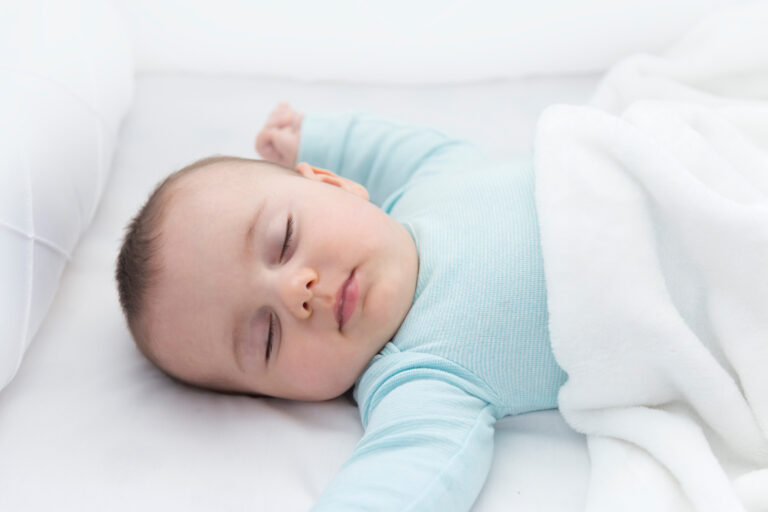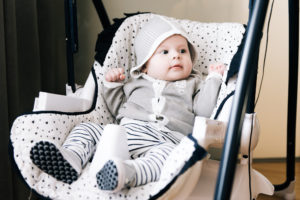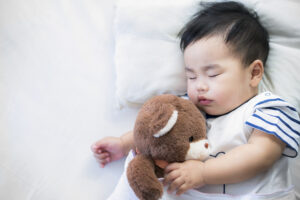When you buy through our links, we may earn a commission. Products or services may be offered by an affiliated entity. Learn more.
How Much Do Newborns Sleep?
Newborns sleep a lot. But the amount of sleep a healthy baby gets can vary widely. Experts note that newborns may sleep as few as 11 hours or as many as 19 hours each day, depending on their temperament.
Parents and caregivers often have questions about their baby’s sleep. It can be helpful for caregivers to learn about sleep patterns in newborns and how sleep needs change as a baby gets older. It may also be helpful to consider ways to make the newborn’s sleep environment as safe as possible, while setting the stage for good sleep habits during childhood.
Newborn Sleep Patterns
Newborn sleep is spread throughout the day because babies develop their circadian rhythms over time. Circadian rhythms are the near 24-hour cycles in the body that align with the pattern of night and day, influencing when people fall asleep and when they wake up. So while newborns do a lot of sleeping, their sleep cycle involves short spurts of one to two hours until their body has time to establish a circadian rhythm.
Newborn sleep is also segmented because infants need to eat often during the day and night. To get the nutrition they need for healthy development , newborns feed about every two hours when breastfeeding and every three hours when bottle feeding. They may feed even more frequently when going through a growth spurt.
Parents and caregivers may get some relief after the first four to six weeks, when many newborns begin to develop a more consistent sleep-wake cycle, spending around four hours asleep and four hours awake at a time.
Sleeping Through the Night
Parents and caregivers often look forward to when their baby will sleep through the night. As they grow and their nervous system develops, babies usually start to sleep more during the night by about 4 to 6 months of age. At this point an infant may be able to stay asleep for longer periods of time, with stretches of continuous sleep between five and eight hours.
By 9 to 12 months of age, most infants can sleep longer at night without needing to be fed. Parents and caregivers can typically expect eight to nine hours of uninterrupted sleep by the time their baby turns 1 year old.
Keep in mind that even after a baby starts to sleep through the night, they may have difficulties transitioning to falling asleep on their own or cry when being put to bed. For infants who are 6 to 9 months in age, this may be due to separation anxiety.
Can Newborns Sleep Too Much?
It is normal for newborns to sleep for a long time, especially soon after coming home from the hospital. In many cases, parents and caregivers need not be concerned about a newborn sleeping too much . However, if a newborn sleeps through a feeding, it may be necessary to wake them up to eat.
While all babies are different, newborns who breastfeed or drink formula usually need to eat at least every four hours. So if a newborn is asleep and it is time for a feeding, sometimes a diaper change or gently touching them will help them wake up.
1Best Way for a Baby to Sleep
The safest way for newborns to sleep is by themselves , lying on their back , in a crib or bassinet that meets federal safety standards. This is true whether a newborn is sleeping during the day or at night.
Of course, sometimes a baby falls asleep while being held or when resting on a caregiver’s shoulder. When they drift off during feeding, burping, cuddling, or rocking, it is still safest to put them back into their crib or bassinet . Do the same when newborns fall asleep in a baby swing, car seat, or stroller.
Is Co-Sleeping Safe for Newborns?
Letting a newborn sleep in the parent’s bed may be tempting for tired caregivers and is a common practice in some cultures. However, experts caution parents and caregivers about sharing a bed because it has been shown to increase the risk of sudden infant death syndrome (SIDS) and other sleep-related accidents, including suffocation and entrapment.
While sharing a bed is not safe, the American Academy of Pediatrics does recommend that caregivers share a room with their newborn. Putting a baby’s crib or bassinet in the room where the caregiver sleeps for at least the first 6 months can help keep infants safe and make it easier to check on them during the night.
Can a Newborn Sleep With a Blanket?
Baby blankets are soft and cute, but when placed in a newborn’s sleeping area they can significantly increase the risk of SIDS. For the first year of life, blankets, soft toys, pillows, and bumper pads should all be kept out of a newborn’s crib or bassinet.
Tips for a Safe Sleep Environment for a Newborn
Experts have found that there are certain things parents and caregivers can do to reduce the risk of sleep-related deaths in newborns and infants up to 1 year old.
- Back sleeping: Lay the baby down on their back anytime they sleep, day or night. The crib mattress or bottom of a bassinet or portable crib should be firm and flat.
- A clear crib: Keep the baby’s sleep space clear of blankets, bumper pads, pillows, and toys. Use only a fitted sheet designed for this purpose.
- Room sharing: Put the baby’s crib or bassinet in the room where parents or caregivers sleep, but do not sleep in the same bed. Room sharing allows caregivers to check on the baby regularly. Baby monitors can provide peace of mind for parents and caregivers, but should not be used as a substitute for safe sleep guidelines.
- Comfortable clothing: Dress the baby so they will be comfortable without getting too hot, in only one layer more than the caregiver is wearing. Babies can also stay warm by wearing a sleep sack instead of using blankets.
- Pacifier use: Let the baby use a pacifier for sleeping, but do not attach it to their clothing or any other object.
- Swaddling: Swaddle the baby if it helps them sleep, but only until they have learned to roll over, which usually happens around 3 months of age. Always place a swaddled baby down to sleep on their back.
- No secondhand smoke: The sleep environment should be smoke-free. Exposure to secondhand smoke can increase the risk of SIDS.
Help Your Baby Sleep Better With Pediatric Sleep Coaching

our partner at sleepdoctor.com
Learn More“Life-changing! My anxiety about my son’s sleeping habits were immediately reduced after talking to Sara. She went above and beyond to tailor a schedule to our goals, answer our questions, keep us on track, and check in to encourage us when we just thought we couldn’t do it anymore.”
Rachael B. – Verified Customer
Helping a Newborn Sleep
Newborns have an irregular sleep pattern that changes as they grow , but there are things parents and caregivers can do to keep them comfortable and help them fall asleep. It may take time to determine the best way to help your newborn sleep, and you may need to try different approaches and make adjustments as needed.
- Recognize when a baby is tired: When a newborn cries, fusses, or rubs their eyes, it is probably time for them to sleep.
- Establish a routine: Have a consistent routine around sleep. This may include giving them a bath, singing a lullaby, and feeding them before putting them in their crib. Following the same routine can help signal to your baby that it is time for sleep.
- Put the baby in their crib before they have completely fallen asleep: This will help them learn to fall asleep on their own and help prevent future sleep problems .
- Calm a crying newborn: Hold them close, sing or talk softly, or play soothing music. Do not worry about spoiling a newborn .
- Be mindful of feedings: A well-fed newborn should sleep for two to three hours at a time. If they sleep for shorter periods and appear to be hungry when they wake, they may not be eating enough during feedings. Consult your pediatrician for additional guidance regarding feeding and any concerns you may have.

Help a Newborn Learn to Sleep More at Night
Newborns sleep and eat around the clock, but caregivers can take steps to set the stage for sleeping more at night when they are old enough, which is usually by 4 to 6 months.
- During the day: When the baby is awake, keep them in a room where the lights are on or light can come through the windows. Let them hear plenty of everyday noises while they are awake, such as talking or cars going by outside. The environment should be dark and quiet when the baby is sleeping.
- In the evening: Start to quiet things down as it gets closer to the baby’s bedtime. This is not the time to play or put the baby around lots of people or TV noise.
- At night: Keep the room where the baby sleeps dark and quiet. Use a dim night light for nighttime feedings.
When to Talk to Your Pediatrician
From birth to 3 months, newborns do a lot of sleeping. How much they sleep varies widely from baby to baby and even week to week. If you are worried that your baby is sleeping too much or too little, be sure to talk to your pediatrician.

Still have questions? Ask our community!
Join our Sleep Care Community — a trusted hub of sleep health professionals, product specialists, and people just like you. Whether you need expert sleep advice for your insomnia or you’re searching for the perfect mattress, we’ve got you covered. Get personalized guidance from the experts who know sleep best.
References
12 Sources
-
Yates, J. (2018). PERSPECTIVE: The long-term effects of light exposure on establishment of newborn circadian rhythm. Journal of Clinical Sleep Medicine, 14(10), 1829–1830.
https://pubmed.ncbi.nlm.nih.gov/30353824/ -
Consolini, D. M. (2021, September). Sleeping in newborns and infants. Merck Manual Consumer Version., Retrieved January 16, 2023, from
https://www.merckmanuals.com/home/children-s-health-issues/care-of-newborns-and-infants/sleeping-in-newborns-and-infants -
National Center for Chronic Disease Prevention and Health Promotion, Division of Nutrition, Physical Activity, and Obesity. (2022, April 11). How much and how often to breastfeed. Centers for Disease Control and Prevention., Retrieved on January 16, 2023, from
https://www.cdc.gov/nutrition/infantandtoddlernutrition/breastfeeding/how-much-and-how-often.html -
A.D.A.M. Medical Encyclopedia. (2021, February 2). Infant-newborn development. MedlinePlus., Retrieved on January 16, 2023, from
https://medlineplus.gov/ency/article/002004.htm -
A.D.A.M. Medical Encyclopedia. (2020, October 2). Bedtime habits for infants and children. MedlinePlus., Retrieved on January 16, 2023, from
https://medlineplus.gov/ency/article/002392.htm -
Hirshkowitz, M., Whiton, K., Albert, S. M., Alessi, C., Bruni, O., DonCarlos, L., Hazen, N., Herman, J., Adams Hillard, P. J., Katz, E. S., Kheirandish-Gozal, L., Neubauer, D. N., O’Donnell, A. E., Ohayon, M., Peever, J., Rawding, R., Sachdeva, R. C., Setters, B., Vitiello, M. V., & Ware, J. C. (2015). National Sleep Foundation’s updated sleep duration recommendations: Final report. Sleep Health, 1(4), 233–243.
https://pubmed.ncbi.nlm.nih.gov/29073398/ -
American Academy of Pediatrics. (2022). Safe sleep and your baby: How parents can reduce the risk of SIDS and suffocation. Pediatric Patient Education., Retrieved January 16, 2023, from
https://publications.aap.org/patiented/article/doi/10.1542/peo_document088/79989/Safe-Sleep-and-Your-Baby-How-Parents-Can-Reduce -
Corwin, M. J. (2022, July 26). Sudden infant death syndrome: Risk factors and risk reduction strategies. In G. B. Mallory & S. M. Misra (Eds.). UpToDate., Retrieved January 16, 2023, from
https://www.uptodate.com/contents/sudden-infant-death-syndrome-risk-factors-and-risk-reduction-strategies -
National Institute of Child Health and Human Development. (n.d.). Ways to reduce baby’s risk., Retrieved January 16, 2023, from
https://safetosleep.nichd.nih.gov/safesleepbasics/risk/reduce -
American Academy of Family Physicians. What you need to know about sleep for your child. (2022). American Family Physician, 105(2).
https://pubmed.ncbi.nlm.nih.gov/35166516/ -
Consolini, D. M. (2021, September). Sleeping in infants and children. Merck Manual Professional Version., Retrieved January 19, 2023, from
https://www.merckmanuals.com/professional/pediatrics/care-of-newborns-and-infants/sleeping-in-infants-and-children -
A.D.A.M. Medical Encyclopedia. (2021, December 10). Crying in infancy. MedlinePlus., Retrieved on January 16, 2023, from
https://medlineplus.gov/ency/article/002397.htm




























